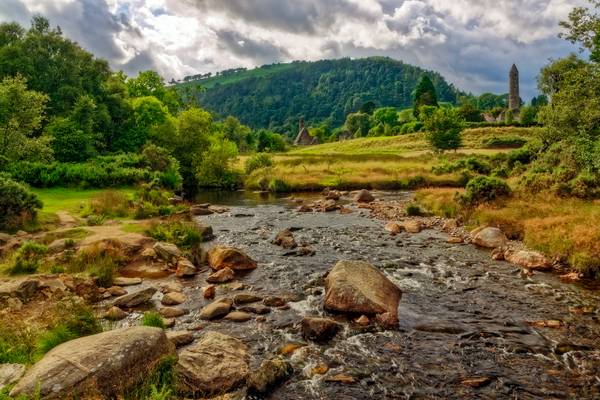Ireland »
Gleann Dá Loch

0
Meaning “Valley of two lakes”, Gleann Dá Loch (Glendalough) in County Wicklow, Ireland, was a monastic settlement established in the 6th century by Saint Kevin.
Kevin was a hermit who lived in a hole in the wall of a cliff near one of the lakes. It seems, however, that God had other plans for Kevin, as the hermit gave in to his proclivity and allowed a monastic community to form around him. Kevin left his cliffside hole for the valley below where his disciples built a small cathedral and a drystone beehive-shaped hut for their master. The monks all lived singly within their own huts. They did all the things that kept a village live and kicking, yet also gathered at appointed hours to chant Psalms… this included two such appointments that had them gather in the dark of night. That devotion was expressed by one of the monks in this way:
The wind over the Hog’s Back moans, It takes the trees and lays them low, And shivering monks o’er frozen stones To the twain hours of nighttime go.
What in this picture seems evident of the first line of that verse?
The hospitality of the Irish stretches back through the centuries. Many from throughout Ireland sat at the feet of the monks to learn of all they had to teach. The community soon outgrew its village, so the monks built more to sustain their community of seekers… and to it was drawn not just students from all over Ireland, but also from England and all over Europe. Were it not for places such as Gleann Dá Loch, civilization as we know it would be altogether different.
This was yet another park Sean Mulligan brought us to within driving distance of Dublin. It likely appears little differently than it did over 1400 years ago. From this spot can be seen the cathedral and the tower of that monastic village. The Round Tower, as it is known, was used both for storage and for protection from invaders, such as the Vikings. The door to enter the tower is 12 feet above the ground… in case of attack, the community would climb up a ladder and then draw the ladder up after them. “Vikings, you say? In Ireland?” According to, and correctly so, by our consummate guide Sean, the city of Dublin, the capital of Ireland, was founded by Vikings around the 8th century.